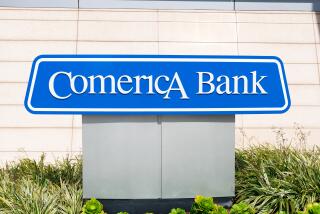JPMorgan expansion defies Obama’s agenda
- Share via
Reporting from New York — Like other giant banks, JPMorgan Chase & Co. has been criticized for being “too big to fail.” But that isn’t stopping the company from getting even bigger.
The country’s second-largest bank said Tuesday that it had agreed to buy, for $1.7 billion, part of a commodity trading business jointly owned by San Diego-based Sempra Energy and Royal Bank of Scotland.
The acquisition comes as President Obama and former Federal Reserve chief Paul Volcker have been pushing a proposal to make banks like JPMorgan smaller. Could the bank, led by Chief Executive Jamie Dimon, be thumbing its nose in the direction of Obama and Volcker? At least one widely followed bank analyst thinks so -- and likes it.
“I believe that Mr. Dimon is demonstrating a courage sorely lacking elsewhere among other leaders of American banks,” Richard Bove of Rochdale Securities wrote in a note to clients. Bove has been critical of the Obama administration’s efforts to rein in banks.
Bove said the acquisition seemed to run contrary to the White House’s agenda not only because it would make JPMorgan bigger but also because it would add to the company’s capacity to conduct securities trading with its own money, known as proprietary trading.
Obama wants to stop commercial banks from doing any proprietary trading, saying it is too risky for institutions that benefit from federal deposit insurance and other safeguards.
“Is it possible that JPMorgan Chase does not see these proposed rules and laws going into effect for any sustained period or perhaps not at all?” Bove wrote.
In a sign of possible restraint, JPMorgan declined to buy all of the joint venture, RBS Sempra Commodities, opting instead to acquire only its global operations. The unit’s domestic business is to be sold separately.
A spokesman for JPMorgan declined to comment on Bove’s note. In a statement, Jes Staley, head of JPMorgan’s investment banking unit, said, “This almost doubles the number of corporate clients our commodities franchise can serve and enables us to offer them more products in more regions of the world.”
JPMorgan’s shares rose 2.8% on Tuesday, compared with a 2.5% average increase for financial stocks in the Standard & Poor’s 500.
Shares of Sempra fell 1% as utility stocks surged.
Sempra created Sempra Commodities and brought in RBS as a partner in 2008 after concluding that the unit had grown too big for the utility to finance itself. But the European Union is forcing RBS to give up its stake.
The sale to JPMorgan requires regulatory approval.
nathaniel.popper@
latimes.com
More to Read
Inside the business of entertainment
The Wide Shot brings you news, analysis and insights on everything from streaming wars to production — and what it all means for the future.
You may occasionally receive promotional content from the Los Angeles Times.










